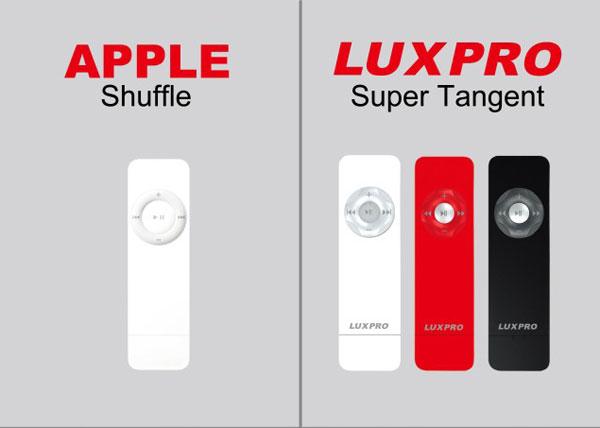Living up to a promise it made in January 2007, Taiwanese electronics maker Luxpro has at last filed a lawsuit against Apple claiming that the American company was plotting a multinational scheme when it sued Luxpro over its iPod shuffle doppelganger.The 19-page suit, submitted on Tuesday to a court in Texarkana, Arkansas, not only accuses Apple of trying to unlawfully interfere with Luxpro's business but of an "unending aspiration" to hold a monopoly over the entire world's supply of portable media players that crushes smaller players underfoot.
Reading more as a promotional piece for the company's business than a direct complaint, the lawsuit says Apple's own legal action in 2005 to shut down sales of the allegedly infringing Super Tangent stemmed from a need to "crush" smaller manufacturers before they became larger, which Luxpro insists was well underway thanks to features Apple didn't have and distribution deals in Canada, China and the US -- a 7,000 unit trial with The Source (Radio Shack) in Canada saw the similarly-designed Top Tangent 'fly' off of shelves, Luxpro is proud to state.
The smaller player does take care to formally charge Apple, insisting the iPod maker is interfering with lawful contracts and violating California's Unfair Competition Law to get its monopoly, but is more concerned with the motives.
Besides tying purchased iTunes Store songs to the iPod, Apple has allegedly used "unfair" legal tactics simply to squash competitors, including countersuing Creative in a patent dispute to force a settlement and let it use licenses for the ZEN maker's patents to subdue competitors. Apple knows many smaller companies are growing faster and can't let that happen, Luxpro claims.
And though the purportedly offending Super Tangent player shipped months after the first iPod shuffle, was originally called the Super Shuffle, and bore an uncanny resemblance to the iPod, Apple was reportedly attempting solely to intimidate and take down Luxpro when it took action at trade shows and in the marketplace to stop the 'obviously' different Tangent series of players from being marketed and sold.

This is also said to have included bullying by proxy: Apple allegedly went through ASUS to force a Polish importer to stop carrying Luxpro's goods, achieving the intended effect while letting Apple "erase its fingerprints" left on the affair.
That hurt Luxpro's chances to get on the GraTei securities market and soured deals with suppliers, the plaintiff adds. Even after Taiwan's Fair Trade Commission exonerated Luxpro, the company had lost months of player orders. Apple is now known to be continuing appeals in court against the FTC that have been submitted as recently as February of this year.
For all its certainty regarding Apple's intent and approach, Luxpro has notably backed off from its aggressive damage claims: where it once said it would ask for as much as $100 million from Apple for lost business, the Taiwan company now says the final amount should be determined by a jury at trial.
In its typical fashion, Apple hasn't commented on the lawsuit or Luxpro's accusations.


